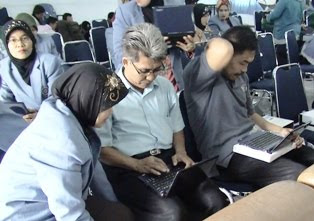The ADDIE model is very popular in Indonesia. Most of the current instructional design models, on this case me as the Task Force of HYLITE program and the lecturer of 23 Provider (Consortium) used the ADDIE model for the Guidlines and modules development. ADDIE represent a dynamic, flexible guideline for building effective training and performance support tools, with its five phases: Analysis, Design, Development, Implementation, and Evaluation. This model attempts to save time and money by catching problems while they are still easy to fix.

In the ADDIE concept, each step has an outcome that feeds into the subsequent step.
Analysis Phase, in the analysis phase, the instructional problem is clarified, the instructional goals and objectives are established and the learning environment and learner's existing knowledge and skills are identified. There are some of the questions that are addressed during the analysis phase:
- Who is the audience and the characteristics?
- Identify the new behavioral outcome.
- What types of learning constraints exist?
- What are the delivery options?
- What are the online pedagogical considerations?
- What are the Adult Learning Theory considerations?
- What is the timeline for project completion?
Design Phase, the design phase deals with learning objectives, assessment instruments, exercises, content, subject matter analysis, lesson planning and media selection. These are steps used for the design phase:
- Documentation of the project's instructional, visual and technical design strategy
- Apply instructional strategies according to the intended behavioral outcomes by domain (cognitive, affective, and psychomotor).
- Design the user interface and user experience
- Prototype creation
- Apply visual design (graphic design)
Development Phase, the development phase is where instructional designers and developers create and assemble the content assets that were blueprinted in the design phase. In this phase, storyboards are created, content is written and graphics are designed. If e learning is involved, programmers work to develop and/or integrate technologies. Testers perform debugging procedures. The project is reviewed and revised according to any feedback given.
Implementation Phase, on the implementation phase, a procedure for training the facilitators and the learners is developed. The facilitators' training should cover the course curriculum, learning outcomes, method of delivery, and testing procedures. Preparation of the learners includes training them on new tools (software or hardware) and student registration. This is also the phase where the project manager ensures that the books, hands-on equipment, tools, CD-ROMs and software are in place, and that the learning application or website is functional.
Evaluation Phase, the evaluation phase consists of two parts: formative and summative. Formative evaluation is present in each stage of the ADDIE process. Summative evaluation consists of tests designed for domain specific criterion-related referenced items and providing opportunities for feedback from the users which were identified.

The HYLITE program is under the Distance Learning Development Grants or BERMUTU (Better Education through Reformed and Universal Teacher Upgrading) Project by World Bank. The project is a competitive development package granted to the instructional materials development team of HYLITE program based on the review and selection by Task Force team. Distance Learning Development Grant for Instructional Materials Development aims at improving the quantity and the quality of instructional materials for HYLITE program, as well as some of its managerial aspects.
The Task Force has developed the guidelines of the instructional materials:
- printed (module)
- audio/video (the design and script), Sample video: Science Education
- web-based (general guidelines, and specific for lecturer, administrator, and student)
- tutorial
- test
There are 12 available modules in HYLITE program are: Multicultural Education, Human rights Education, Science Education, Education for children with special needs, Field Practice, Trends and Issues in Elementary Teaching, Computer and Instructional Media for Elementary Education, Development of Civics Education in Elementary Education, School Based Management, The Teaching of Bahasa Indonesia in Elementary School, Teaching and Learning in Elementary Education, and Art Education.
The 20 new modules to be developed are: Problem Solving in Mathematics, Students Growth and Development, Educational Statistics, Assessment in Elementary Education, Curriculum Development for Elementary Education, Multigrade Teaching and Learning, Professionalism in Teaching, Educational Sociology, Social Sciences for Elementary School, Bahasa Indonesia for Elementary School, Teaching and Learning Strategy, Teaching of Mathematics in Elementary Education, Science Practicum, Educational Research in Elementary Education, Science Teaching in Elementary Education, Physical Education, Instructional Materials Development for Elementary Education, Teaching of Social Science in Elementary Education, English Language, and Final Comprehensive Exam.
The 12 + 20 modules are provided at the HYLITE website (http://pjjpgsd.seamolec.org/). It's limited access for downloading (one provider of the Consortium has one authority, since the web also provide the test for final examination).
The grants are provided through a competition among the teacher colleges with HYLITE program in Indonesia. In order to implement the competition mechanism well, it is necessary for DGHE to have a technical assistant who has knowledge and expertise in managing and following through the competition for this distance learning development grants.
In this case, my task as member of a Task Force will be as technical assistant to manage the distance learning development grants of BERMUTU Program is proposed for support.
Other tasks are:
- to provide support to the management and the implementation of distance learning development grants in DGHE, and to ensure effectiveness and efficiency of the implementation of distance learning development grants of BERMUTU Program in DGHE.
- to work on daily basis to guaranteeing the management and the implementation of distance learning development grants in DGEH, starting from the grants competition announcement, selection, contracting, development process, advising, monitoring, reporting, piloting, finishing, until the submission of the final products.

No comments:
Post a Comment